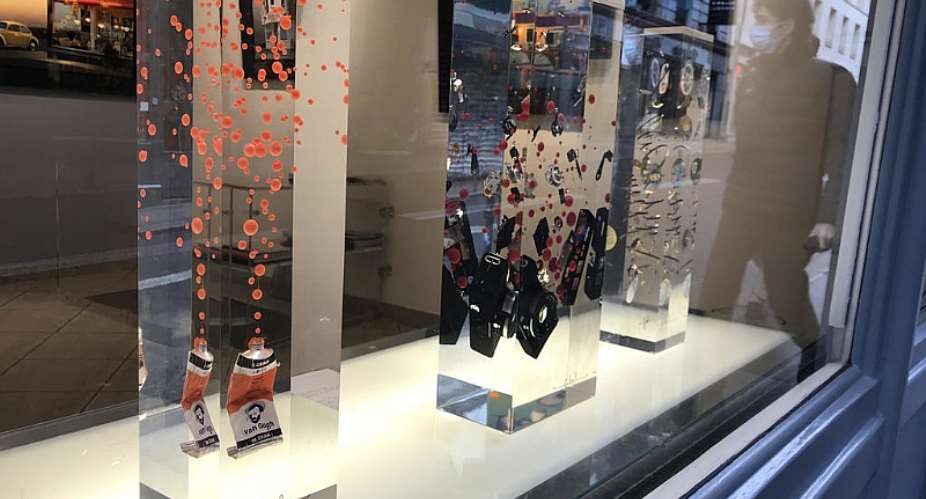While museums in France have indefinitely shut their doors during the Covid-19 pandemic, private art galleries remain open to visitors. But for how long? RFI's Arnab Bérenger has this report.
Nearly a year after the Covid-19 pandemic, Paris' trendy Marais district - normally teeming with life on a Saturday afternoon - has been reduced to a smattering of masked pedestrians and rows of shuttered shop windows.
Since November last year, the French government has allowed only 'essential' services to stay open. This includes supermarkets, take-away food and shops selling electronics and clothes.
Cultural spaces like museums, theatres and cinemas have been deemed 'non-essential' and remain shut, much to the disarray of France's entertainment industry.
However art-lovers in Paris have not been left totally bereft. Private art galleries in the French capital are considered 'essential', and remain open to visitors.
A 'hunger' for art and new opportunities
Justine Durrett, director of the David Zwirner Gallery in Paris, thinks this is positive.
"Galleries are benefitting from larger audiences and more visibility", she told RFI. "There is a need from the public to nourish their souls, a hunger for art"
Durrett foretells "lasting changes" for the "complex ecosystem of galleries, artists, institutions, collectors, auction houses" that constitute the art market.
"These are opportunities as well", she says.
Even if travel restrictions have deprived the gallery of its mostly foreign buyers, Durrett feels that we should learn from this crisis and reevaluate the role of art in society.
"Seeing the central place that culture and art actually has for people in their lives…how much they long to return to it when they're deprived of it — we can build on that as the world hopefully returns to normal, think about making some of these things priorities in our societies", she says.
The show must go on
Next door, Tristan van der Stegen welcomes RFI to the Xippas gallery that is celebrating its 30th anniversary this year.
"The show must go on. Museums and cultural centres are closed, and our gallery offers a space where you can discover historical artists as well as emerging ones", the gallery's director says enthusiastically.
"We've had two confinements and a curfew... This has not stopped people from wanting to discover art."
Stegen feels that visits to an art gallery are of better quality than in a museum.
"People take more time to discover art than they used to. There's less of a rush. So the quality of discussions are in a way more interesting", he says.
Health restrictions also play an important part
"The public today feels more comfortable, feels safer visiting a gallery than a public space" he claims.
According to Stegen, the artist has an essential role during the pandemic.
"The artist provides a commentary on the society we live in, and the conditions we live in. We need to echo their voices as much as possible. They all have something to say about what we're going through. Something which will help us as well, positive messages, warnings, another way of seeing things".
The digital highway
Both Durrret and Stegen concur that art is going through a digital revolution.
"There is a digital highway, and we're on it" says Stegen.
Indeed, most museums, indefinitely shut to the public, have been offering virtual visits and online guided tours.
Nevertheless, for the few who brave the Parisian winter for a stroll in the Marais quarter, dozens of small to medium-sized art galleries offer a rare 'non-virtual' art experience. But for how long?
With fears over a possible third lockdown in France, art galleries may have to shut their doors yet again, making all exhibitions and collections in France go 100% digital.





 'Kill whoever will rig Ejisu by-election' – Independent Candidate supporters inv...
'Kill whoever will rig Ejisu by-election' – Independent Candidate supporters inv...
 Ashanti Region: ‘Apologize to me for claiming I owe electricity bills else... – ...
Ashanti Region: ‘Apologize to me for claiming I owe electricity bills else... – ...
 Ghana is a mess; citizens will stand for their party even if they’re dying — Kof...
Ghana is a mess; citizens will stand for their party even if they’re dying — Kof...
 Internet shutdown an abuse of human rights — CSOs to gov't
Internet shutdown an abuse of human rights — CSOs to gov't
 Free SHS policy: Eating Tom Brown in the morning, afternoon, evening will be a t...
Free SHS policy: Eating Tom Brown in the morning, afternoon, evening will be a t...
 Dumsor: A British energy expert 'lied' Ghanaians, causing us to abandon energy p...
Dumsor: A British energy expert 'lied' Ghanaians, causing us to abandon energy p...
 What a speech! — Imani Africa boss reacts to Prof. Opoku Agyemang’s presentation
What a speech! — Imani Africa boss reacts to Prof. Opoku Agyemang’s presentation
 Dumsor: Tell us the truth — Atik Mohammed to ECG
Dumsor: Tell us the truth — Atik Mohammed to ECG
 Dumsor: Don't rush to demand timetable; the problem may be temporary — Atik Moha...
Dumsor: Don't rush to demand timetable; the problem may be temporary — Atik Moha...
 Space X Starlink’s satellite broadband approved in Ghana — NCA
Space X Starlink’s satellite broadband approved in Ghana — NCA
